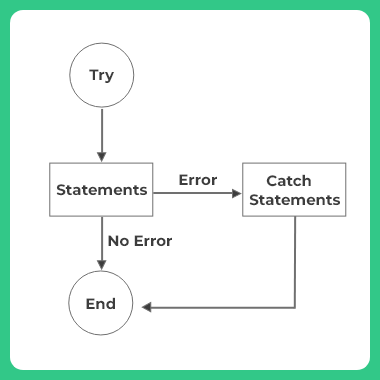Try Catch Block in Java
Try Catch Block in Java
In this article we will be discussing about Try Catch Block in Java.
An Exception occurs when java compiler finds any error or exception in the program that can be occur due to mistake in the code by programmer or for any other reason.

Try Block:
All the code that is to be tested in the program is to be contained in the try block. Try block executes all the code and if exist, It passes the exception to the catch block.
The try block’s remaining statements won’t run if an exception arises at that specific statement. Therefore, it is advised against keeping code in a try block that won’t throw an exception.
Syntax:
try{
// Block of code
} Catch Block:
All the code that is executed in the try block. if it shows any type of exception will be thrown to the catch block. It is used to handle the Exception by declaring the type of exception within the parameter.
Only after the try block, The catch block Should be used. You can use multiple catch block with a single try block.
Syntax:
Catch{
// Block of code
} 
Try & Catch Block:
When try and catch keywords come in pair
Syntax:
try{
// Block of code
Catch{
// Block of code
} Example:
import java.util.*;
public class Main{
public static void main(String[] args) {
// try block
try {
// try block statements
System.out.println("I am in Try Block");
int data=50/0;
}
// catch block
catch(ArithmeticException e){
// catch block exceptions
System.out.println(e);
System.out.println("Catch Block Executed");
}
}
}
Output: I am in Try Block java.lang.ArithmeticException: / by zero Catch Block Executed
Prime Course Trailer
Related Banners
Get PrepInsta Prime & get Access to all 200+ courses offered by PrepInsta in One Subscription
Get over 200+ course One Subscription
Courses like AI/ML, Cloud Computing, Ethical Hacking, C, C++, Java, Python, DSA (All Languages), Competitive Coding (All Languages), TCS, Infosys, Wipro, Amazon, DBMS, SQL and others






Login/Signup to comment